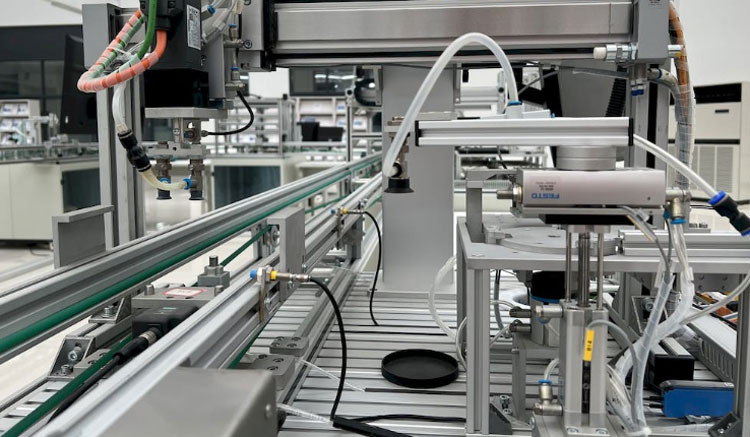Automation in Manufacturing: How Cloud Technology is Transforming Industries

Recent advances in automated technologies and artificial intelligence have transformed the way that business owners across most major industries structure their operations. From the development of informed data analytics programs configured to optimize efficiency, to smart building management systems designed to meet sustainability targets and reduce expenses.
Though these unapologetically modern technologies seem to generate an unprecedented amount of attention, deeper analysis suggests that much of the improvements businesses have been making would not have been possible without an older transformative solution.
Cloud technology may not be as new and exciting as machine learning algorithms and AI tools, but without a reliable cloud-based communication network, these systems would be limited to segregated use. To illustrate just how essential cloud computing continues to be, this article will explore how automation in manufacturing is transforming global industries.
Cloud Adoption in Modern Manufacturing
According to data published in the 2022 WIPRO Redefining Manufacturing for The Digital Era report, the manufacturing industry is surpassing all other industries in the adoption of cloud-based technologies, with 32% of manufacturers currently classed as “cloud leaders”.
The report goes on to state that 56% of those operating cloud-based systems have seen a measurable increase in productivity corresponding to their adoption of cloud management platforms, but how exactly can such a simple organizational change become so impactful?
The key lies in how cloud-based systems are commonly deployed within manufacturing businesses, or more specifically how many aspects of a typical manufacturing facility are directly affected by cloud adoption, including a variety of essential processes such as:
- Inventory management
- Product development
- Sales and marketing
- Customer service
- Supply chain management
- Production line automation
Essentially, by connecting the operation of these processes and the individual systems used to automate, streamline and analyze production, modern manufacturing businesses are able to both better understand where improvements can be made and apply informed solutions.
How Cloud Solutions are Deployed in Manufacturing
Cloud-based management systems are typically integrated with a wide range of additional technologies including devices connected to the Internet of Things (IoT) and intelligent data analysis programs to optimize operational efficiency, common examples are listed below.
Inventory Management
Cloud-based inventory management systems are used to assist teams in automating key processes such as stock counts, material procurement and reordering based on reliable real-time data. Newly delivered items are automatically scanned on arrival, with this data immediately reflected within an internal database to accurately represent inventory levels.
In addition, as materials are used and stock is depleted, the inventory management system will update this database. Staff are then able to program unique inventory level thresholds, which when surpassed, will instruct the system to automatically reorder relevant materials.
Equipment Monitoring
IoT sensors connected to a wider cloud-based management platform can be deployed to provide management teams with live data pertaining to machines on the shop floor. This information will typically be used to monitor productivity, equipment availability and perform frequent diagnostics procedures to ensure that all essential systems are well-maintained.
Cloud-based machine monitoring also assists management teams in optimizing production and maintenance schedules by providing staff with detailed performance data and updated availability information, indicating which machines will be most efficient at any given time.
Quality Control
Cloud-based manufacturing solutions will often be integrated with intelligent data-analysis programs and configured to collect and evaluate information gathered from thousands of active machines across multiple locations, acting to streamline quality control procedures.
Operational data, images and videos can all be collected within the same system and staff can program automated alerts warning of potential defects or anomalies. Teams may also decide to configure automatic shutdowns if machines are determined to be operating in a dangerous or ineffective manner, with staff able to adjust controls from a remote position.
Building Management
According to data released by the US Environmental Protection Agency, around 30% of the energy used in commercial properties is wasted, representing a significant expense for high consumption facilities such as large-scale manufacturing organizations and warehouses.
By integrating a range of IoT environmental sensors and HVAC controls alongside a wider cloud-based building management system, teams can automate essential utilities based on real-time occupancy information, which can result in energy savings of between 30-50%.
Furthermore, cloud-based physical security technology offers several benefits to manufacturing automation. Firstly, it enables secure remote access to critical manufacturing systems and data. With cloud-based security, authorized personnel can provide access to manufacturing automation systems with mobile or key card entry systems while monitoring operations from anywhere, ensuring continuous oversight and control.
Secondly, it provides robust protection against cyber threats. It utilizes advanced encryption, authentication, and intrusion detection mechanisms to safeguard sensitive manufacturing data and intellectual property. This helps prevent unauthorized access, data breaches, and industrial espionage.
How Cloud Manufacturing is Transforming Industries
Most modern industries are at least somewhat reliant on the manufacturing sector producing necessary inventory and materials to keep businesses running. In addition, manufacturing organizations have been amongst the five largest employers in the US in recent years.
In many ways our society as a whole stands to benefit greatly from measurable efficiency and productivity improvements within the manufacturing industry, acting to illustrate how the adoption and implementation of cloud-based systems in manufacturing is likely to have a significant impact on how tangentially related organizations and sectors continue to grow.
Cloud technologies and wider management systems can be applied to almost every aspect of the manufacturing process, dramatically improving efficiency and productivity whilst also reducing costs and minimizing energy waste, with the positive effects of these improvements seemingly helping manufacturing businesses to transform wider industries on a global scale.
Have you read?
Best Fashion Schools In The World.
Best Business Schools In The World.
Best CEOs And C-Suite Executives In The World.
World’s Most Influential and Innovative Companies.
World’s Best Hospitality And Hotel Management Schools.
Ready to join the CEOWORLD magazine Executive Council– Find out if you are eligible to apply.
Add CEOWORLD magazine to your Google News feed.
Follow CEOWORLD magazine headlines on: Google News, LinkedIn, Twitter, and Facebook.
This report/news/ranking/statistics has been prepared only for general guidance on matters of interest and does not constitute professional advice. You should not act upon the information contained in this publication without obtaining specific professional advice. No representation or warranty (express or implied) is given as to the accuracy or completeness of the information contained in this publication, and, to the extent permitted by law, CEOWORLD magazine does not accept or assume any liability, responsibility or duty of care for any consequences of you or anyone else acting, or refraining to act, in reliance on the information contained in this publication or for any decision based on it.
Copyright 2024 The CEOWORLD magazine. All rights reserved. This material (and any extract from it) must not be copied, redistributed or placed on any website, without CEOWORLD magazine' prior written consent. For media queries, please contact: info@ceoworld.biz
SUBSCRIBE NEWSLETTER








